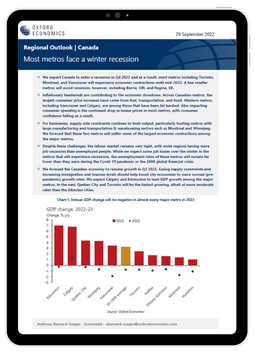Most Canadian metros face a winter recession

We expect Canada to enter a recession in Q4 2022 and as a result, most metros including Toronto, Montreal, and Vancouver will experience economic contractions until mid-2023. A few smaller metros will avoid recession, however, including Barrie, ON, and Regina, SK.
What you will learn:
- Inflationary headwinds are contributing to the economic slowdown. Across Canadian metros, the largest consumer price increases have come from fuel, transportation, and food. Western metros, including Vancouver and Calgary, are among those that have been hit hardest.
- For businesses, supply-side constraints continue to limit output, particularly hurting metros with large manufacturing and transportation & warehousing sectors such as Montreal and Winnipeg. We forecast that these two metros will suffer some of the largest economic contractions among the major metros.
- Despite these challenges, the labour market remains very tight, with some regions having more job vacancies than unemployed people. While we expect some job losses over the winter in the metros that will experience recessions, the unemployment rates of these metros will remain far lower than they were during the Covid-19 pandemic or the 2008 global financial crisis.
Tags:
Related Services

Service
Canadian Province and Metro Service
Data and forecasts for Canadian provinces and metropolitan areas.
Find Out More
Service
Canada Macro Service
Comprehensive coverage of the Canadian economy, providing clients with all of the information they need to assess the impact of developments in the economy on their business.
Find Out More
Service
Canada Provincial Territorial Model
A rigorous and comprehensive framework to develop forecasts, scenarios and impact analysis at the national, provincial and territorial levels.
Find Out More